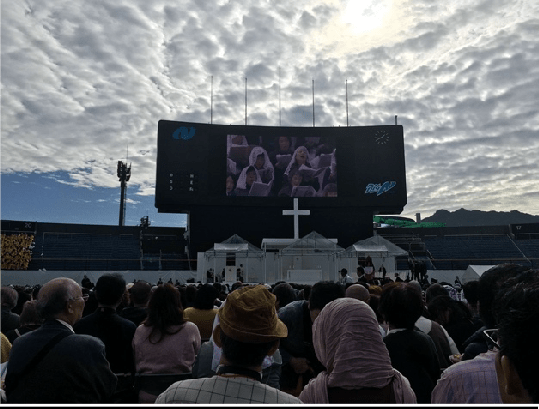Image by G McClelland, The Papal Mass, 2019, Urakami, 200 metres from Ground Zero.
Presented by Gwyn McClelland this paper, scheduled for one day before Hiroshima Day and four before Nagasaki, will focus on the findings from her oral history project in Nagasaki, with additional comments about the impacts of COVID-19 on commemoration of the 75th anniversaries.
On 9 August 1945, the United States dropped the second atomic bomb ever used in wartime on Nagasaki, resulting in a death toll of up to 70,000 people within the day and around the same number again from injuries within a year. Of the dead, approximately 8,500 on the day were Catholic Christians, representing sixty to seventy-five percent of their own community and over ten percent of the total.
As Gwyn interviewed, it was evident that the survival of the bombing was understood in parallel to the survival of the community over 250 years of persecution until at least 1873. One survivor with whom she was able to speak told her about her grandmother who survived both the bombing and the ‘Fourth Persecution’ of the 1860s-70s. Another survivor was orphaned, and became a brother in a Catholic order, later travelling to Poland to research the founder of the order, who had died in Auschwitz. Although Nagasaki is renowned in Japan at least as having been more passive than Hiroshima in response to the bomb, Gwyn’s research shows that at least some of the Catholic survivors have recently been moved through their ongoing lament to a more vociferous protest.
Presenter
Gwyn McClelland was appointed as a Japanese Lecturer in the School of HASS at UNE in June 2020. His research lies at the intersection of history, theology and trauma studies. Recently Gwyn was awarded a Japan Foundation fellowship to begin a new oral history project in the Goto Archipelago one hundred kilometres from Nagasaki, but it is not clear if it will be possible to take it up given the current situation with the pandemic.
Join the Seminar
HASS seminars are via Zoom. Click the link to watch the live lecture and participate in discussion. If this is your first time on Zoom you will be asked to install the Zoom client. Follow prompts such as ‘open link’, ‘download and run Zoom’ or ‘join with computer audio’. Please mute your microphone. Join the Zoom Meeting here:
The seminar will be held at 4pm Wednesday, 5 August 2020 via Zoom
https://une-au.zoom.us/j/98267167581?pwd=ZFI4RHhpbU03cDI1enF1bzhHRGdrZz09
Enquiries to: Karin von Strokirch – kvonstro@une.edu.au

